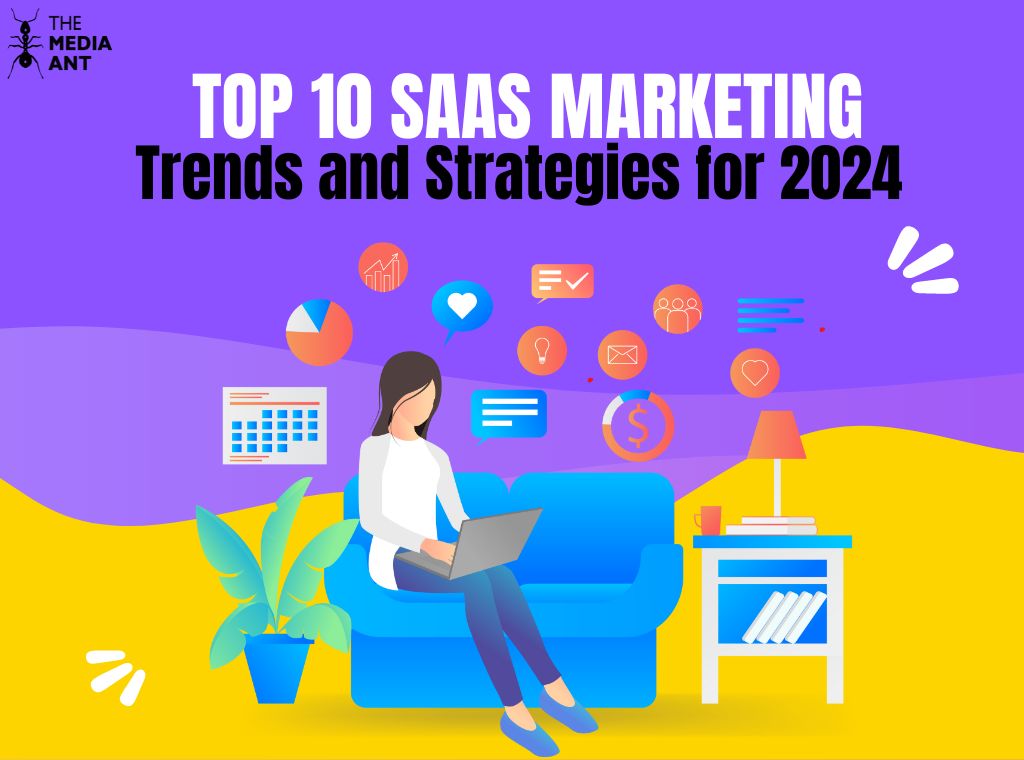SaaS marketing, or Software as a Service marketing, refers to the strategic efforts and tactics employed to promote and sell cloud-based software solutions. Unlike traditional software products, SaaS products are hosted and accessed via the internet, offering users a subscription-based model for access. The SaaS industry continues to witness transformative shifts, driven by technological innovations, changing consumer behaviors, and market dynamics.
To navigate these complexities and capitalize on emerging opportunities, it’s essential for SaaS marketers to embrace the latest trends and strategies shaping the landscape. Join us on an exploration of the top 10 SaaS marketing trends and strategies poised to define success in 2025 and beyond. From AI-powered personalization to the rise of immersive experiences, this comprehensive guide will equip you with the insights and tactics needed to elevate your SaaS marketing efforts and drive sustainable growth in the years ahead.
Top 10 SaaS Marketing Trends and Strategies for 2025
1. Adapting to the “Software Recession”
The “Software Recession” presents challenges and opportunities for SaaS marketing. As businesses tighten budgets, SaaS companies must adapt their strategies. One key trend is prioritizing customer retention over acquisition. Focusing on providing value and nurturing existing relationships becomes paramount. Additionally, embracing flexible pricing models, such as usage-based or freemium, can attract cost-conscious customers. Leveraging data analytics to understand changing market demands and customer behaviors is crucial for refining marketing strategies.
Moreover, investing in content marketing and thought leadership can establish credibility and attract leads organically. Embracing agile methodologies allows SaaS companies to quickly adjust to market shifts and deliver value-driven solutions. Overall, navigating the “Software Recession” demands agility, customer-centricity, and innovation in SaaS marketing strategies.
2. Customer Retention Takes Center Stage
In SaaS marketing, customer retention emerges as a focal point, signaling a shift from traditional acquisition-centric approaches. Recognizing the cost-effectiveness and long-term benefits, SaaS companies are doubling down on strategies to enhance customer satisfaction and loyalty. Personalized communication, tailored to individual user needs and preferences, becomes paramount. Offering proactive customer support and timely assistance further solidifies relationships. Moreover, leveraging data analytics to anticipate churn indicators allows companies to intervene proactively and mitigate attrition.
Implementing loyalty programs and incentivizing renewals incentivizes ongoing engagement. Additionally, continuously refining the product based on user feedback ensures sustained relevance and value delivery. By prioritizing customer retention, SaaS companies not only foster loyalty but also unlock opportunities for upselling and advocacy, contributing to long-term business growth and sustainability.
3. The Rise of AI-powered Marketing
In SaaS marketing, the ascent of AI-powered solutions revolutionizes how companies engage with prospects and customers. AI empowers marketers to personalize experiences at scale, leveraging predictive analytics to anticipate user preferences and behavior.
Through sophisticated algorithms, AI optimizes content delivery, ensuring the right message reaches the right audience at the right time. Chatbots and virtual assistants powered by AI streamline customer interactions, providing instant support and enhancing user satisfaction. Moreover, AI-driven insights gleaned from vast datasets enable marketers to refine targeting strategies and optimize campaign performance continuously.
By automating repetitive tasks and providing actionable insights, AI frees up marketers to focus on creativity and strategy formulation. Embracing AI-powered marketing not only enhances efficiency and effectiveness but also positions SaaS companies at the forefront of innovation, driving competitive advantage and fostering sustainable growth in a dynamic market landscape.
4. Compelling Video Marketing
With the growing dominance of visual media consumption, SaaS companies leverage video marketing to convey complex ideas succinctly and memorably. Through engaging storytelling and visually appealing narratives, videos effectively showcase product features, benefits, and use cases. Moreover, video content fosters authenticity and trust, as viewers connect emotionally with the brand.
Whether through product demos, customer testimonials, or explainer videos, SaaS companies leverage the power of video to educate, entertain, and inspire action. By incorporating compelling video marketing into their strategies, SaaS brands can effectively cut through the noise, capture attention, and forge meaningful connections with their target audience, ultimately driving conversions and business growth.
5. SEO for Product and Feature Pages
In SaaS marketing, optimizing product and feature pages for SEO (Search Engine Optimization) has become increasingly crucial for visibility and organic traffic generation. By strategically incorporating relevant keywords, meta tags, and descriptive content, SaaS companies ensure that their offerings rank higher in search engine results pages (SERPs).
Detailed product descriptions, accompanied by engaging visuals and multimedia elements, enhance user experience and encourage longer page dwell times, signaling relevance to search engines. Moreover, implementing structured data markup enables search engines to understand and display product information more accurately, potentially increasing click-through rates.
Additionally, leveraging internal linking strategies to connect product pages with relevant content further strengthens SEO efforts and improves website navigation. By prioritizing SEO for product and feature pages, SaaS companies can attract qualified leads actively searching for solutions, increase brand visibility, and ultimately drive conversions and revenue growth.
6. Building a Community
SaaS companies are recognizing the value of fostering a sense of belonging and collaboration among users. By creating dedicated forums, online communities, and social media groups, companies facilitate peer-to-peer interactions, knowledge sharing, and support exchange. Engaging with community members through discussions, webinars, and user-generated content not only strengthens brand loyalty but also provides invaluable insights for product improvement and innovation.
Moreover, a vibrant community serves as a valuable marketing asset, with satisfied users becoming advocates who amplify brand messaging and refer new customers. By nurturing a community-centric approach, SaaS companies cultivate a loyal user base, drive user retention, and differentiate themselves in a competitive market landscape, ultimately fostering sustainable growth and success.
7. Focus on User-Generated Content (UGC)
In SaaS marketing, there’s a notable shift towards leveraging user-generated content (UGC) as a key strategy. SaaS companies recognize the authenticity and credibility that user-generated content holds in influencing potential customers. By encouraging users to share their experiences, testimonials, and success stories, companies create a rich tapestry of content that resonates with prospects. UGC serves as social proof, demonstrating real-world applications and benefits of the software.
Moreover, incorporating UGC into marketing campaigns humanizes the brand and fosters a sense of community among users. Platforms like social media, review sites, and dedicated forums serve as fertile ground for harvesting UGC. By actively engaging with and amplifying user-generated content, SaaS companies not only strengthen brand credibility but also increase reach and engagement organically. Ultimately, prioritizing UGC in marketing strategies enhances authenticity, trust, and customer loyalty, driving sustained growth and success.
8. Account-Based Marketing (ABM) for High-Value Accounts
Unlike traditional mass marketing tactics, ABM focuses on personalized engagement with specific companies or accounts deemed most valuable. SaaS companies identify key accounts based on factors like revenue potential, industry influence, or strategic alignment. They then create bespoke marketing campaigns, tailored content, and personalized outreach efforts aimed at addressing the unique needs and pain points of these target accounts.
By aligning sales and marketing teams closely, Account Based Marketing ensures a coordinated approach to nurturing relationships and driving conversions within these high-value accounts. This highly targeted and personalized strategy not only increases the likelihood of success but also enhances customer satisfaction and retention, ultimately driving revenue growth and maximizing return on investment (ROI) for SaaS companies.
9. Personalization is Key
In SaaS marketing, personalization has emerged as a cornerstone strategy for engaging and converting customers effectively. By harnessing data analytics and user insights, SaaS companies can tailor their marketing efforts to meet the specific needs, preferences, and behaviors of individual users. This entails delivering personalized content, recommendations, and offers through various channels, such as email marketing, website experiences, and in-app messaging.
Personalization goes beyond merely addressing customers by name; it involves anticipating their needs and providing relevant solutions at each stage of the customer journey. By delivering tailored experiences, SaaS companies can foster deeper connections, enhance customer satisfaction, and drive higher conversion rates. Moreover, personalization contributes to brand loyalty and advocacy, as customers feel valued and understood by the brand. Embracing personalization as a core strategy enables SaaS companies to differentiate themselves in a competitive market landscape and drive sustainable growth.
10. The Power of Social Selling
In the realm of SaaS marketing, the power of social selling has become increasingly evident as social media platforms continue to dominate online interactions. Social selling involves leveraging social networks to identify, engage, and nurture prospects, ultimately driving sales. SaaS companies harness the vast reach and targeting capabilities of platforms like LinkedIn, Twitter, and Facebook to establish meaningful connections with potential customers.
By sharing valuable content, participating in relevant discussions, and building relationships with decision-makers, sales professionals can position themselves as trusted advisors and thought leaders within their industry. Social selling enables a more personalized and authentic approach to prospecting and relationship-building, leading to higher conversion rates and shorter sales cycles.
Moreover, by tapping into social networks, SaaS companies can amplify their brand presence, generate leads, and ultimately drive revenue growth in an increasingly digital and interconnected world.





